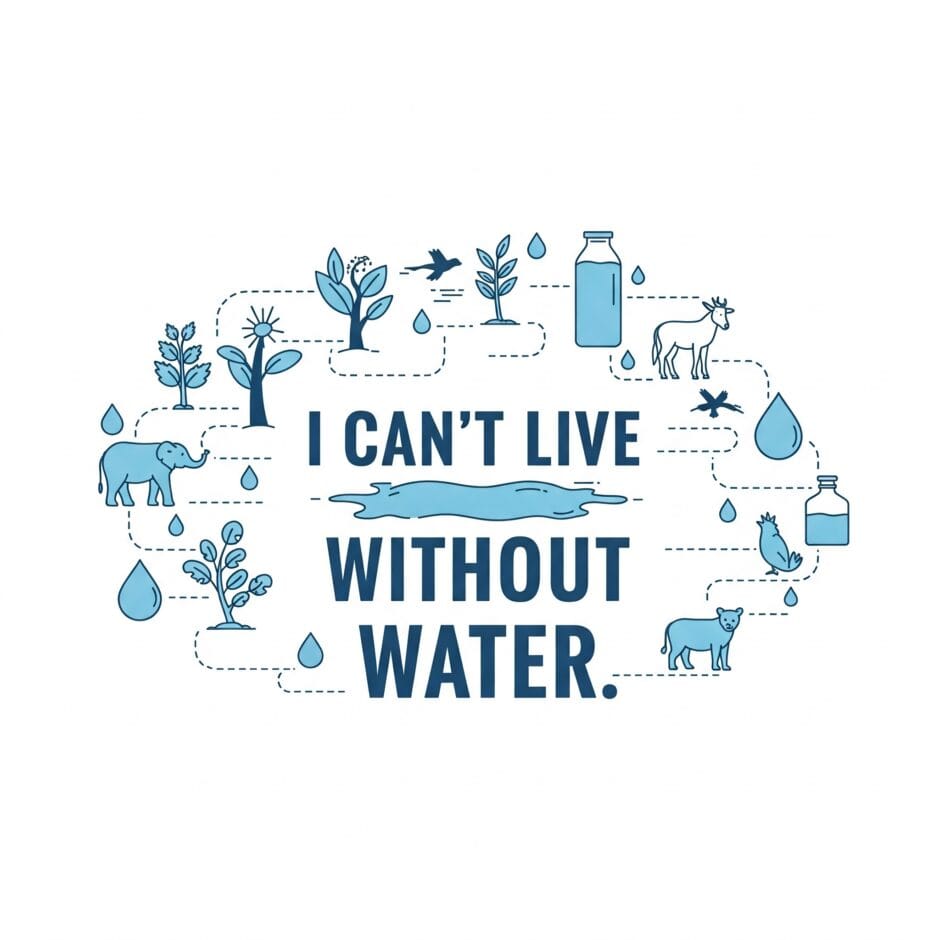withoutの基本について知ろう
英語の「without」は、前置詞として使われ、「~なしで」「~せずに」という意味を表します。ここでは、「without」の主な意味と用法、関連表現について解説します。
1. 主な意味と用法
- ~なしで (not having, being, doing, or experiencing something):
- あるものが存在しない状態、またはある行為や経験を伴わない状態を表します。
- 例: “I can’t live without water.” (私は水なしでは生きられない。)
- 例: “She left the house without saying goodbye.” (彼女はさよならも言わずに家を出た。)
- あるものが存在しない状態、またはある行為や経験を伴わない状態を表します。
- ~せずに (not doing something):
- ある行為を行わないことを表します。
- 例: “He passed the exam without studying.” (彼は勉強せずに試験に合格した。)
- ある行為を行わないことを表します。
2. 文中での位置
- 「without」は、名詞、代名詞、動名詞の前に置かれます。
- 例: “without money” (お金なしで)
- 例: “without him” (彼なしで)
- 例: “without saying” (言わずに)
3. 関連表現
- without any:
- 「少しも~なしで」という意味で、否定的な意味合いを強調します。
- 例: “without any doubt” (少しも疑いなく)
- 「少しも~なしで」という意味で、否定的な意味合いを強調します。
- without fail:
- 「必ず」「間違いなく」という意味で、確実性を強調します。
- 例: “He calls me without fail every Sunday.” (彼は毎週日曜日に必ず私に電話をくれる。)
- 「必ず」「間違いなく」という意味で、確実性を強調します。
- free of:
- 「~がない」「~を含まない」という意味で、特定のものが含まれていないことを表します。
- 例: “sugar-free” (砂糖を含まない)
- 例: “tax-free” (税金がかからない)
- 「~がない」「~を含まない」という意味で、特定のものが含まれていないことを表します。
4. 注意点
- 「without」は否定的な意味合いを持つため、肯定的な文脈では使用しません。
- 「without」を含む文は、二重否定にならないように注意が必要です。
withoutの類似表現について知ろう
英語の「without」は、前置詞として様々な意味を持ち、類似表現も多岐にわたります。ここでは、「without」の主な意味と用法ごとに、類似表現とそれぞれのニュアンスの違いを解説します。
1. ~なしで (not having) の類似表現
- lacking:
- 意味: ~を欠いている
- ニュアンス: 何かが不足している状態を表します。
- 例: “lacking in experience” (経験不足)
- missing:
- 意味: ~がない、~を失っている
- ニュアンス: 何かが存在しない、または失われた状態を表します。
- 例: “missing the point” (要点を外している)
- devoid of:
- 意味: ~が全くない
- ニュアンス: 何かが完全に欠けている状態を強調します。
- 例: “devoid of emotion” (感情が全くない)
- free of:
- 意味: ~がない、~を含まない
- ニュアンス: 特定のものが含まれていない状態を表します。
- 例: “sugar-free” (砂糖を含まない)
2. ~せずに (not doing) の類似表現
- without doing:
- 意味: ~することなく
- ニュアンス: 「without」の基本的な意味と同じですが、動名詞を伴う場合に用いられます。
- 例: “without saying a word” (一言も言わずに)
- instead of doing:
- 意味: ~する代わりに
- ニュアンス: ある行為の代わりに別の行為を行うことを表します。
- 例: “instead of going out” (外出する代わりに)
- rather than doing:
- 意味: ~するよりもむしろ
- ニュアンス: ある行為よりも別の行為を好むことを表します。
- 例: “rather than complaining” (不平を言うよりもむしろ)
3. その他の類似表現
- in the absence of:
- 意味: ~がない状態で
- ニュアンス: フォーマルな表現で、何かが存在しない状況を表します。
- 例: “in the absence of evidence” (証拠がない状態で)
- but for:
- 意味: ~がなければ
- ニュアンス: 仮定法で用いられ、何かが存在しない場合に起こりうる結果を表します。
- 例: “but for your help” (あなたの助けがなければ)
使い分けのポイント
- 文脈やニュアンスに合わせて、適切な類似表現を選ぶことが重要です。
- フォーマルな場面では、「devoid of」「in the absence of」「but for」などを使うと良いでしょう。
- 日常会話では、「lacking」「missing」「instead of」などがよく使われます。
「without」の類似表現一覧表
| withoutの意味 | 類似表現 | ニュアンスの違い | 例文 |
|---|---|---|---|
| ~なしで (not having) | lacking | 何かが不足している状態を表す | lacking in experience (経験不足) |
| ~なしで (not having) | missing | 何かが存在しない、または失われた状態を表す | missing the point (要点を外している) |
| ~なしで (not having) | devoid of | 何かが完全に欠けている状態を強調する | devoid of emotion (感情が全くない) |
| ~なしで (not having) | free of | 特定のものが含まれていない状態を表す | sugar-free (砂糖を含まない) |
| ~せずに (not doing) | without doing | 「without」の基本的な意味と同じだが、動名詞を伴う場合に用いる | without saying a word (一言も言わずに) |
| ~せずに (not doing) | instead of doing | ある行為の代わりに別の行為を行うことを表す | instead of going out (外出する代わりに) |
| ~せずに (not doing) | rather than doing | ある行為よりも別の行為を好むことを表す | rather than complaining (不平を言うよりもむしろ) |
| その他の類似表現 | in the absence of | フォーマルな表現で、何かが存在しない状況を表す | in the absence of evidence (証拠がない状態で) |
| その他の類似表現 | but for | 仮定法で用いられ、何かが存在しない場合に起こりうる結果を表す | but for your help (あなたの助けがなければ) |
withoutの比喩表現を知ろう
1. 欠如・不在を象徴する比喩
- “a life without purpose”
- 意味: 目的のない人生
- 解説: 人生において、目標や意義が欠けている状態を表します。
- 例文: “He felt like he was living a life without purpose, drifting from one job to another.” (彼はまるで目的のない人生を送っているように感じ、次から次へと仕事を転々としていた。)
- “a world without color”
- 意味: 色のない世界
- 解説: 個性や多様性が失われた、単調な世界を表します。
- 例文: “The city seemed like a world without color, all the buildings were gray and identical.” (その都市はまるで色のない世界のようで、建物はすべて灰色で同じ形をしていた。)
- “a song without melody”
- 意味: メロディーのない歌
- 解説: 魅力や感動を欠いた、つまらないものを表します。
- 例文: “His speech was like a song without melody, just a series of monotonous words.” (彼のスピーチはまるでメロディーのない歌のようで、単調な言葉の羅列だった。)
- “a day without sunshine”
- 意味: 日差しのない日
- 解説: 喜びや希望が欠けた、暗い一日を表します。
- 例文: “For her, every day without her children was like a day without sunshine.” (彼女にとって、子供たちのいない日は、まるで日差しのない日のようだった。)
2. 不足・欠乏を象徴する比喩
- “a heart without warmth”
- 意味: 温かみのない心
- 解説: 思いやりや愛情が欠けている、冷たい心を表します。
- 例文: “His heart was without warmth, he never showed any compassion to others.” (彼の心は温かみがなく、他人への思いやりを全く示さなかった。)
- “a mind without curiosity”
- 意味: 好奇心のない精神
- 解説: 探求心や学習意欲が欠けている状態を表します。
- 例文: “A mind without curiosity is like a garden without flowers.” (好奇心のない精神は、花のない庭のようなものだ。)
- “a story without suspense”
- 意味: サスペンスのない物語
- 解説: 緊張感や興奮を欠いた、退屈な物語を表します。
- 例文: “The movie was a story without suspense, I knew exactly what was going to happen.” (その映画はサスペンスのない物語で、何が起こるか完全に予想できた。)
- “a meal without salt”
- 意味: 塩のない食事
- 解説: 味気なく、物足りないものを表します。
- 例文: “Life without dreams is like a meal without salt.” (夢のない人生は、塩のない食事のようなものだ。)
3. 能力・可能性の欠如を象徴する比喩
- “a bird without wings”
- 意味: 翼のない鳥
- 解説: 本来持っているべき能力や可能性を欠いている状態を表します。
- 例文: “Without your support, I feel like a bird without wings.” (あなたの支援がなければ、私は翼のない鳥のように感じる。)
- “a fish without water”
- 意味: 水のない魚
- 解説: 生きるために不可欠なものを失った状態を表します。
- 例文: “He was like a fish without water in the big city.” (彼は大都市で、水のない魚のようだった。)
withoutに関連する練習問題に挑戦しよう
問題 1: 次の文を日本語に訳しましょう。
- I can’t live without water.
- She left the house without saying goodbye.
- He passed the exam without studying.
- He felt like he was living a life without purpose.
- The city seemed like a world without color.
問題 2: 次の日本語の文を英語に訳しましょう。
- 私は水なしでは生きられない。
- 彼女はさよならも言わずに家を出た。
- 彼は勉強せずに試験に合格した。
- 彼は目的のない人生を送っているように感じた。
- その都市は色がない世界のように思えた。
問題 3: 次の文の ( ) に適切な語句を選びましょう。
- He passed the exam ( ) studying. (a) lacking (b) without (c) missing
- The city seemed ( ) color. (a) without (b) lacking (c) devoid of
- He left ( ) saying a word. (a) instead of (b) without (c) rather than
- ( ) your help, I couldn’t have done it. (a) Lacking (b) Without (c) Devoid of
- He spoke ( ) any hesitation. (a) without (b) missing (c) instead of
問題 4: 次の文の誤りを訂正しましょう。
- I can’t live lacking water.
- She left the house missing saying goodbye.
- He passed the exam instead of studying.
- He felt like he was living a life devoid purpose.
- The city seemed a world missing color.
問題 5: 次の文を ( ) 内の指示に従って書き換えましょう。
- I can’t live if I don’t have water. (without を使って)
- She left the house and didn’t say goodbye. (without を使って)
- He passed the exam even though he didn’t study. (without を使って)
- He felt like he was living a purposeless life. (without を使って)
- The city seemed like a colorless world. (without を使って)
解答
問題 1: 日本語訳
- 私は水なしでは生きられない。
- 彼女はさよならも言わずに家を出た。
- 彼は勉強せずに試験に合格した。
- 彼は目的のない人生を送っているように感じた。
- その都市は色がない世界のように思えた。
問題 2: 英訳
- I can’t live without water.
- She left the house without saying goodbye.
- He passed the exam without studying.
- He felt like he was living a life without purpose.
- The city seemed like a world without color.
問題 3: 語句選択
- (b)
- (a)
- (b)
- (b)
- (a)
問題 4: 誤り訂正
- I can’t live without water.
- She left the house without saying goodbye.
- He passed the exam without studying.
- He felt like he was living a life without purpose.
- The city seemed like a world without color.
問題 5: 書き換え
- I can’t live without water.
- She left the house without saying goodbye.
- He passed the exam without studying.
- He felt like he was living a life without purpose.
- The city seemed like a world without color.
ポイント:
- 「without」の意味と用法を理解しましょう。
- 文脈に合わせて適切な語句を選べるように練習しましょう。
- 例文を作ることで、表現の使い方を具体的にイメージしましょう。
てばっち英語研究所|おすすめ学習ツール
【書籍】
今日の解説で「なるほど!」と思った方には、ぜひ手に取ってほしい一冊があります。
それが、『一億人の英文法』**です。 専門用語の暗記ではなく、「なぜネイティブはこう言うのか?」というイメージを徹底的に解説してくれます。
私はこの本に出会って、英語の景色がガラリと変わりました。 解説を読んで「もっと深く知りたい」と感じたなら、間違いなくあなたのバイブルになります。
【オンライン英会話】
知識として理解できたら、次は『自分の言葉』として使ってみることが上達の近道です。 Camblyなら、予約なしですぐにネイティブ講師と繋がれるので、今日学んだ知識をさっそく会話で試してみませんか?
【コーチング】
文法を理解しても、それを使いこなすための『圧倒的な練習量』を一人でこなすのは至難の業です。 もし、あなたが『今度こそ、絶対に挫折したくない』と本気で思っているなら、ライザップイングリッシュの門を叩いてみてください。専属トレーナーが、あなたの学習を1分単位で管理し、短期間で劇的な変化をもたらします。


![[商品価格に関しましては、リンクが作成された時点と現時点で情報が変更されている場合がございます。] [商品価格に関しましては、リンクが作成された時点と現時点で情報が変更されている場合がございます。]](https://hbb.afl.rakuten.co.jp/hgb/508699a7.eb9372ff.508699a8.27a980f1/?me_id=1213310&item_id=15566187&pc=https%3A%2F%2Fthumbnail.image.rakuten.co.jp%2F%400_mall%2Fbook%2Fcabinet%2F5278%2F9784890855278_1_4.jpg%3F_ex%3D240x240&s=240x240&t=picttext)



